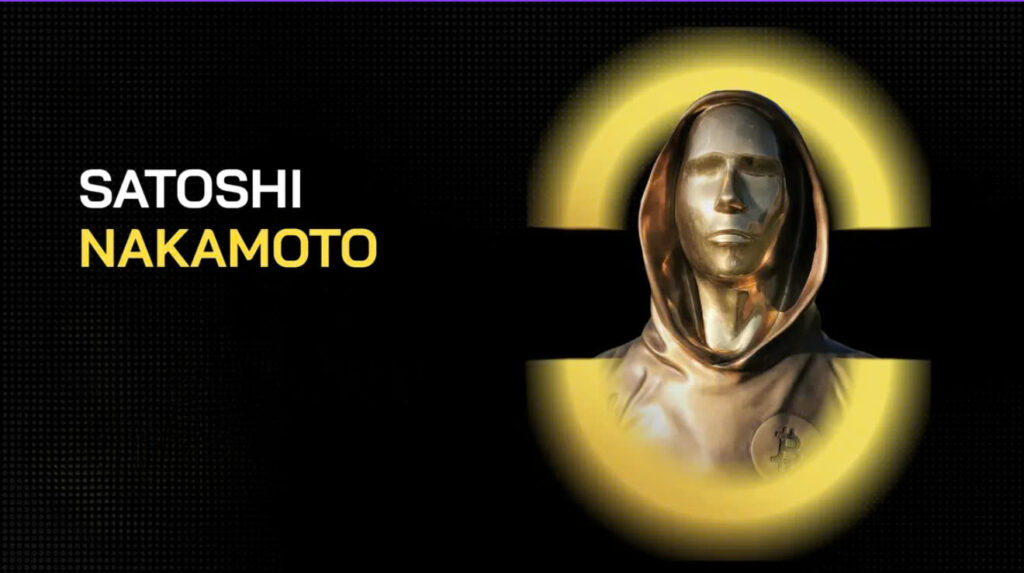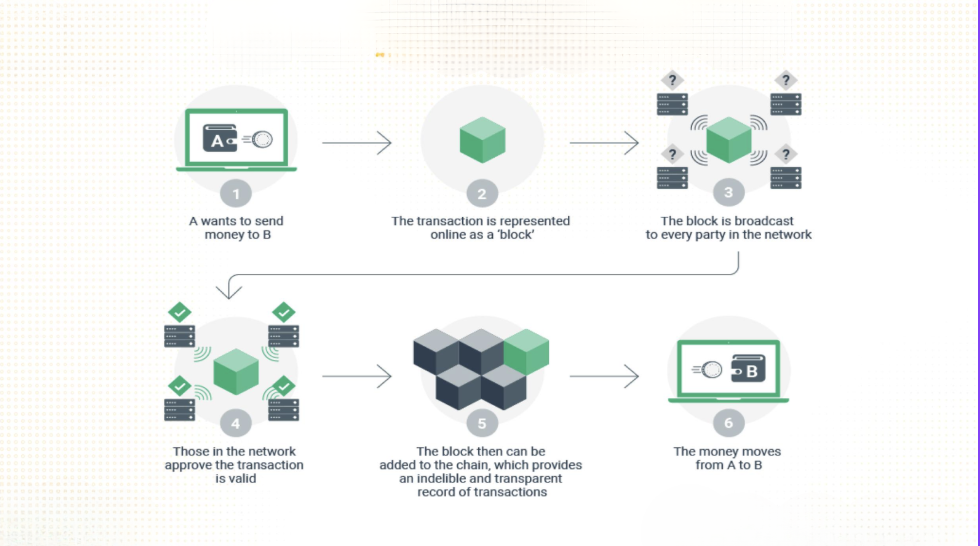What is Bitcoin?
Bitcoin is the world’s first cryptocurrency, created on Blockchain technology, by an anonymous character named Satoshi Nakamoto. Bitcoin was first introduced in 2009. The birth of Bitcoin laid the foundation for the development of the current crypto market.

Bitcoin uses a peer-to-peer network, meaning that the sender transacts directly with the recipient without going through any intermediary. This eliminates unnecessary fees and makes each transaction much cheaper than international money transfer services.

In the world, there are a total of 21,000,000 BTC that have been created. No one will be able to change this number, including the founder Satoshi Nakamoto.
As of March 2024, there have been ~19.6 million BTC mined and only ~1 million BTC left to be mined.
Bitcoin not only has the largest unit, Bitcoin (BTC), but also has a smaller unit, Satoshi (or sts) – named after the founder of Bitcoin.
How does Bitcoin work?
Bitcoin operates on blockchain technology, a distributed and public system. Each Bitcoin transaction is attached to a block, and these blocks are linked together to form a blockchain. The Bitcoin network consists of thousands of nodes (or computers) around the world, responsible for confirming and recording transactions.
When a Bitcoin transaction is created, it is broadcast to the network and waits for confirmation from nodes in the system. These nodes check the validity of the transaction, including authenticating the origin of the Bitcoin funds and checking the digital signature. Once the transaction is confirmed, it is packaged into a new block and added to the blockchain.

The process of confirming and recording transactions is done by Bitcoin miners. These people use their computer’s computing power to solve complex arithmetic problems, called “mining”. Successful miners will be rewarded with a certain amount of Bitcoin and the new block will be added to the blockchain.
This mechanism ensures the integrity and reliability of the Bitcoin system. In addition, the use of blockchain helps prevent fraud and changes in transaction history, because once a block has been added to the blockchain, it is almost impossible to change.
In general, Bitcoin operates as a decentralized electronic cash system, not owned by any organization and based on blockchain technology to ensure the integrity and authenticity of transactions.
What are the characteristics of Bitcoin?
Bitcoin is similar to all fiat currencies such as USD, Euro, VND… but is electronically encrypted.
Decentralization
In the traditional financial market (Centralized Finance), fiat currencies will be controlled by organizations such as Central Banks or Governments.
However, Bitcoin is not. Instead, for transactions to be executed and validated, they need the consensus of many nodes participating in the Bitcoin network.
The nodes in the network will be controlled by different individuals/organizations (called miners) and they are located all over the world. When more than 50% of the nodes in the network accept a transaction, creating a common consensus, the transaction will be successful.

Based on the image above, you can see that the Bitcoin network is not controlled by any entity in an excessive way, the strongest organization is Foundry USA, which only holds 22% of the Hashrate market share.
Therefore, Bitcoin is considered a decentralized blockchain that cannot be attacked.
Security
In theory, you can hack the Bitcoin network to reverse transactions or perform malicious actions for profit. However, in reality, no one has been able to do this because Bitcoin has a very high security system.
Bitcoin’s security is guaranteed by 2 factors:
Decentralization: If you want to hack the Bitcoin network, you need to control 51% of the network’s Hashrate at that time. However, this is impossible because the cost of owning that computing power will be very high. According to estimates, the cost to attack Bitcoin in 1 hour is more than 700,000 USD without taking into account other risks.
SHA-256 algorithm: This is a secure hashing algorithm used to create hashes that cannot be reversed. According to calculations by experts from the University of Sussex, for a quantum computer to be able to break Bitcoin in 1 hour, it would require 317 million qubits, while the most powerful computer today only has 127 qubits. That is also the reason why once a transaction has been made, you will not be able to undo or get your money back because the information has now been recorded in the network, no one will be able to change or edit that information.
Transparency
For USD in circulation on the market, we will not be able to know exactly how many have been issued. All figures are only announced through the government and there are also errors because the integrity of paper money cannot be controlled after a period of use.
However, for Bitcoin, all information is recorded on the blockchain ledger. This means that anyone can become a miner, anyone can read the network’s data.
Low Transaction Fees
Compared to the cost of international money transfers through institutions like banks, Bitcoin transaction fees are relatively low.

In fact, each bank will have a different way of charging fees. However, most banks will charge a fee as a percentage of the amount you need to send, while Blockchain will charge based on the number of transactions.
For example: If you send about 10,000 USD abroad, the fee cannot be lower than 100 USD, not to mention the time it takes to do the paperwork. For Bitcoin, the fee is only 1 USD/transaction with a waiting time of one hour.
Finiteness and difficulty to mine
These are two characteristics that help Bitcoin be considered Digital Gold. If Gold is a finite resource on Earth, Bitcoin is finite on the Blockchain (limited to 21 million Bitcoins).
For the above reason, the rarity of mining BTC is also getting harder and harder. To mine Bitcoin, miners must continuously upgrade their mining machines because the difficulty of the Bitcoin network (Hashrate) has continuously increased.

Disadvantages of Bitcoin
Although Bitcoin has the largest market capitalization in the crypto market, Bitcoin still has many limitations:
- Low block size 1MB
- Slow network: Only 7 transactions/second.
- Transaction fees are not too high but not low enough to compete with other blockchains.
- Not very applicable because there is no Smart Contract like Ethereum.
Since the birth of Bitcoin, many solutions have been launched to handle the above limitations. However, Hard Forks do not bring value to Bitcoin, so there have been some solutions that have a direct impact: SegWit, SegWit2x, Lighting Network.
How to make a profit from Bitcoin.
Bitcoin Mining
Bitcoin mining is the activity of becoming a node of the Bitcoin network, also known as a “miner”. Miners use coin mining machines to solve mathematical problems and receive rewards.
This reward comes from 2 sources:
Transaction fees paid by users to the network: When users transact, there will be rewards=
Block rewards from the Bitcoin network
According to Nakamoto Satoshi’s vision, the block reward is like an incentive to attract initial users and miners to operate the Bitcoin machine. When Bitcoin is strong enough, has a community, and the value of BTC increases, the Bitcoin network will operate automatically without the need for block rewards.
Buy and hold Bitcoin
In essence, holding Bitcoin is when investors buy BTC at a low price, hold it for a long time, wait for the price to increase, and sell it for a profit. The decision to buy and sell will be based mainly on fundamental analysis, evaluation, and prediction of the future of the project, not just on technical analysis.
However, investors must have great faith in Bitcoin and have a lot of patience.
How to store Bitcoin (BTC)?
Store Bitcoin on the exchange
Most CEX exchanges support Bitcoin trading, so you can also store Bitcoin on the exchange. However, for investors with large assets, storing assets on the exchange is not recommended.
The collapse of FTX is the biggest proof that storing on the exchange will leave a lot of risks. Therefore, you should store with Non-custodial wallets (Decentralized wallets) to have full control over your assets.
If you leave assets on the exchange for convenient trading, you should choose large and reputable exchanges such as Binance, Bybit, Coinbase, OKX…
Bitcoin storage wallet
To store Bitcoin, users need to prepare a Bitcoin wallet. In which, a Non-custodial wallet (decentralized wallet) is the safest type of wallet for investors to have full control over their assets.
Each Bitcoin wallet will include:
- A public address (like the account number and owner name) called Bitcoin Address.
- A private key (like the password of an Internet Banking account) is Private Key or Passphrase.
A special note is that decentralized wallets will not be able to restore Private key or Passphrase. Therefore, users are required to store Private key or Passphrase carefully and not disclose it to anyone, even if it is the party that supports you in creating a wallet such as Coin98 Super Wallet, Metamask, Trust…
Risks of holding Bitcoin that investors need to know
Market risks
Not only Bitcoin, the crypto market is also highly risky due to high price fluctuations. Therefore, you should only invest with small capital to minimize risks. Bitcoin has an extremely “crazy” price history:
- 1/2016-2/2017: 400-1000 USD/BTC
- 12/2017: Peaked at 17,000 USD/BTC
- 8/2018: Returned to the bottom of the cycle at 3,400 USD/BTC
- 4/2021: Peaked at 63,000 USD/BTC
- 7/2021: Decreased to 31,000 USD/BTC
- 11/2021: ATH peaked at 67,000 USD/BTC
- 1/2023: Sliding to 16,000 USD/BTC
Security Risks
Security is a factor that most users care about when holding Bitcoin. If the account is not properly secured, investors may lose all the assets they hold.
Legal Risks
The level of Bitcoin recognition in different countries. Therefore, investors need to carefully study the regulations of the country they live in to have appropriate Bitcoin investment activities.
Why was Bitcoin created and has value?
According to newly updated data from Coingecko, BTC reached its highest price of $73,737/BTC on March 14, 2024. But this is not the real value of BTC, but only reflects the law of supply and demand of the market.
According to the information mentioned above, the greatest value of Bitcoin comes from its decentralization. This is one of the types of assets that are not controlled by agencies/organizations/Governments, are not suspended from trading or eliminated by a country’s decision or law.
For billionaires or tycoons, limited assets such as Bitcoin, Gold, real estate are real assets, while fiat currencies are always inflated. Therefore, Bitcoin is considered to be an investment channel or a shelter for currency inflation.
Although Bitcoin cannot be held like Gold or has a certificate like real estate, that is also an advantage because Bitcoin cannot be counterfeited and is not controlled. On the contrary, Bitcoin can be accessed anywhere as long as you have an Internet connection.
Organizations that buy & hold Bitcoin
In addition to individuals holding BTC, companies also announce that they hold Bitcoin. However, it will be difficult for us to track through Blockchain Explorer because they can use 3rd party custody services such as Coinbase, BitGo… or divide into many small wallets to hold.

The number of wallets with Bitcoin balances is recorded at 43 million. Of which:
- Top 10 holders account for 5.4%
- Top 20 holders account for 7.4%
- Top 50 holders account for 10.7%
- Top 100 holders account for 13.5%
With the ownership ratio being evenly distributed, this shows that Bitcoin is an asset that is not controlled by any entity.
Top Bitcoin holders will often change, you can follow it here. According to the data above, we cannot determine who Bitcoin belongs to because most of the largest wallets are exchange wallets, and exchange wallets contain investors’ assets.



